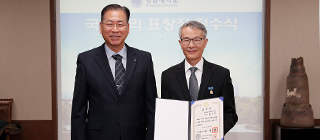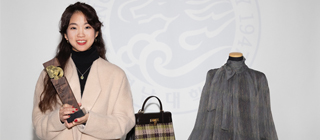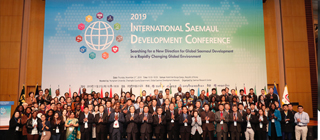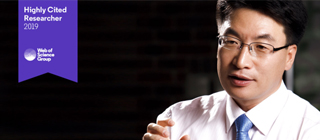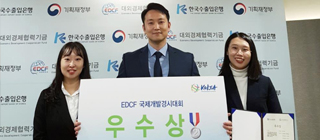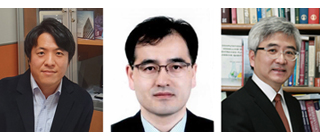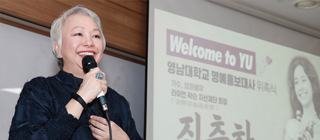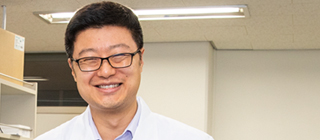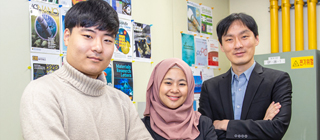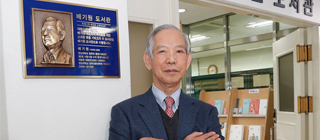-
Contributions in spreading and developing Saemaul Undong for developing countries through Saemaul education, improving the international reputation of Korea Education and research of the Saemaul training program in link with KOICA... Provided plans to apply ‘Saemaul’ in developing countries [December 3, 2019] YU Park Chung Hee School of Policy and Saemaul Dean Kim Gi-soo (61, photo on right) received the Prime Minister’s medal. He was recognized for his contributions in improving the international reputation of the Republic of Korea by spreading the Saemaul Undong to developing countries, thereby providing a cornerstone for the development of developing countries. Dean Kim Gi-soo served as the vice-dean of the Park Chung Hee School of Policy and Saemaul from February 2014 and took the position of dean from February 2017. Dean Kim has been teaching the theories and experiences of rural development and economic development based on the Saemaul Undong of Korea for international students from developing countries. Dean Kim has been active not only in the graduate school programs, but also with research and education activities in connection with other institutes such as KOICA and YU Institute for International Development Cooperation. Dean Kim has been sharing the Saemaul Undong and Korea’s economic development experience by planning the Saemaul Training Program for public employees of developing countries and non-government organization development experts, and has been passing on knowhow for plans to apply the Saemaul Undong for developing countries. Meanwhile, YU established the Park Chung Hee School of Policy and Saemaul to foster global Saemaul leaders for developing countries in November 2011. Unlike international students in regular undergraduate and graduate schools, international students at the Park Chung Hee School of Policy and Saemaul are made up of public employees, employees of public institutes, social activists, and professionals who plan and execute policies in their nations. This program graduated 593 students from 63 countries around the world including from Asia, Africa, Europe and the Americas, and the graduates are taking the leading in spreading Saemeul Undong and local social development in their home countries.
-
Majored in ‘textile design’ at the Department of Living Products Design in undergraduate and graduate school Living products including clothes and bags applying weaved textile designs First place after competing with students, general public and designers [December 5, 2019] <YU Graduate School of Living Products Design Kim Hyun-jung won the grand prize at the 2019 Daegu Industrial Design Expo> Miss Kim Hyun-jung (26, master’s degree in textile design) from the YU Graduate School of Living Products Design won the grand prize at the 2019 Daegu Industrial Design Expo. Works were submitted to a total of four areas such as visual design, industrial craft, product and environment design, and service design at the Daegu Industrial Design Expo, and Miss Kim submitted her textile design product in the industrial craft sector. Undergraduate, graduate students, amateurs and professional designers submitted their works in this expo to compete with each other. The works were received from October and after the preliminary reviews, a total of 17 made it o the finals where the final reviews were held on November 28. The 17 participants held presentations on the intent and techniques of their works, and in result, Miss Kim’s work took first place. The pieces submitted by Miss Kim were titled ‘Sentences in Time 2019’ (photo on right). The textile designs produced by weaving were applied in the clothes, bags, wallets, and tablet PC cases in these product designs. Miss Kim’s works were put on display at the ‘Design Week in Daegu 2019’ held at the Daegu EXCO. Miss Kim graduated from the YU Department of Living Products Design in February 2016 and in September of the same year, she went on to the master’s degree course at the YU Graduate School and is scheduled to graduate in February of next year. Miss Kim has been recognized early on for her knack and skills as a designer. She was selected as an outstanding artist in the ‘2016 DNMD Young Creative Korea’ and participated in special exhibits, and last year, she won the participation prize at the 49th Gyeongsangbuk-do Industrial Design Exhibition Award and special award at the 37th Daegu Design Exhibition Award. In November, she held her first solo exhibit based on her research results and works gained by majoring in textile design at the Daegu Gallery J One. Miss Kim said, “After graduating in February of next year, I plan to study a bit more abroad. I want to study weaving in more depth.”
-
International academic conference held to search for a new direction for global Saemaul development in a rapidly changing global environment Joined by over 250 scholars, experts and development sector public employees from 23 countries [November 21, 2019] <The 2019 International Saemaul Development Conference was held at the Daegu Interburgo Hotel on the 21st> The 2019 International Saemaul Development Conference was held at the Daegu Interburgo Hotel on November 21 under the theme, ‘Searching for a New Direction for Global Saemaul Development in a Rapidly Changing Global Environment’. This international academic conference co-hosted by YU (President Sur Gil-soo), Cheongdo-gun and the Global Saemaul Development Network (hereinafter GSDN) was joined by over 250 people including scholars, experts and public employees in the development sector from 23 countries. This academic conference was made up of a total of four sessions with different topics and a general session, and discussions on practicing the Saemaul spirit and the effective application of the Saemaul development model for developing countries in Asia and Africa were held. In his keynote address, YU President Sur Gil-soo emphasized, “The biggest driving force behind Korea being able to come out of absolute poverty and become an advanced industrial nation was the Saemaul Undong. The reason why Korea was able to become an economic powerhouse with national income of 30,000 USD was because of the ‘Saemaul Undong’ that spread from rural areas to cities and from the homes to work.” President Sur added, “YU has continued to conduct research and education on the Saemaul Undong from the mid-1970s until now and many professors and researchers centering on Professor Choi Wae-chul are working hard to spread the Saemaul Undong to developing countries and to solve common issues of the global community.” He also stated, “It is necessary for us to recognize the need for Saemaul Undong to play a leading role in resolving the common issues of the global community and as the president of YU, I will spare no effort or support for this.” Meanwhile, GSDN Chairman Choi Wae-chul said, “Through the advancement of science technologies, the labor of humans can be replaced by machines and therefore, it will be possible to use the surplus time more valuably.” He gave meaning to this academic conference saying, “This is a gathering for thinking about and working on a safer and happier life for not just me and us, but for everybody.” YU has continuously worked on becoming equipped with the best infrastructure for education and research for the Saemaul Undong. YU began research on the Saemaul Undong from the 1970s and opened the Park Chung Hee Leadership Research Institute (currently Park Chung Hee Saemaul Research Institute) in 2009, Saemaul Research Center in 2010, Park Chung Hee School of Policy and Saemaul (PSPS) in 2011, and the Department of Saemaul and International Development in 2015 to construct the academic foundation for the Saemaul Undong. Meanwhile, Cheongdo-gun, which is known to be the place where the Saemaul Undong first originated, signed an MOU with YU in 2011 to install and operate the Saemaul Research Center. It not only holds the International Saemaul Development Conference, but is also actively engaged in globalization of the Saemaul Undong in countries like the Philippines and Vietnam to lead the global Saemaul Undong. The Global Saemaul Development Network (GSDN), which is one of the co-hosts of this academic conference, is a non-government international organization launched as a foundation in 2015 and it is leading the formation of pan-global networks to share the experience of Saemaul development. It currently has over 500 individual and institutional members in 65 countries. YU, Cheongdo-gun and GSDN has been holding the International Saemaul Development Conference every year, and this conference is playing a leading role in global Saemaul development. In the four sessions with different themes for this academic conference, cases of applying Saemaul development in different regional development fields such as in Asia (Bangladesh, Vietnam, Indonesia, Cambodia) and Africa (Ghana, Rwanda, Uganda, Zimbabwe, Kenya, Tanzania) were introduced. Furthermore, case-studies on improving the environment for international students at YU were also presented. Meanwhile, in the general discussions hosted by PSPS Dean Kim Gi-soo, Governor Abuya Karim of the Sumunep Regency in East Java, Indonesia, Dr. Martin Dinha the president of the Zimbabwe Railroad Corporation and former minister of state, Gyeongbuk Techno Park President Lee Jae-hoon, and PSPS Vice Dean Jung Jin-young held discussions on applying global Saemaul development and to search for a new direction in international development cooperation according to the rapidly changing global environment. Zimbabwe National Railroad Corporation Martin Dinha said at this academic conference, “I was very impressed with the Saemaul Undong and the economic development of Korea, and we gained many implications for the development of infrastructure such as railways.” YU Saemaul Research Center Director Park Seung-woo that hosted this academic conference said, “Despite huge amounts of development aid being poured in, most development aid did not have meaningful outcomes in many of the developing countries, and so a new conceptual framework is needed for international development cooperation.” He also stated, “The core element of the Saemaul Undong is development based on the assertive participation and self-helping efforts of residents,” while adding, “(this academic conference) will provide a good lesson on how effectively the Saemaul development model is at regional development sites in various countries such as Asia and Africa, and for the global Saemaul development program.”
-
‘Top 1% in thesis citation ranking’ in the three fields of computer science, engineering and mathematics Only 11 researchers in the world selected for three fields... Only person in Korea Professor Park’s former student, Chonbuk National University Professor Lee Tae-hee also selected in top 1%, passing down research capacities [November 20, 2019] YU Department of Electrical Engineering Professor Park Joo-hyun (51) was selected as the world’s top 1% researcher for the fifth consecutive year. In addition to the mathematics sector for which he was selected every year since 2015, he was also selected as the top 1% in the world for computer science and engineering as well. There are only 11 people in the world selected in the top 1% of the world in three or more fields. He is the only one to have achieved this feat in Korea. This shows that even among global researchers, he is recognized for his unparalleled research capacities. The global information analysis service company, Clarivate Analytics (hereinafter called Clarivate) announced the list of the ‘2019 most influential researchers in the world, otherwise known as ’the top 1% researchers in thesis citations (highly cited researchers, HCR). There were 6,216 researchers from over 60 countries around the world listed in this year’s HCR. There were a total of 41 researchers selected for HCR in Korea, and 39 of them were Korean citizens. A total of four researchers including Professor Park were selected in two or more fields. HCR are selected from a total of 22 fields including 21 fields in the science and social science fields and one cross field (cross field, researcher with high influence in various research fields). One point worth noting is that 18 researchers from Korea were listed in this year’s cross field, and Professor Lee Tae-hee of the Chonbuk National University Department of Electronic Engineering, who was a student of Professor Park Joo-hyun, was also listed. Professor Lee earned his bachelor’s, master’s and PhD at YU, while completing his post-doctorate studies at Deakin University in Australia, and finally being appointed as a professor of Chonbuk National University in September 2017. He trained at Professor Park’s lab, which became the cornerstone for him to grow into a world-renowned researcher. Clarivate analyzes the ‘Web of Science’, which is known to be the world’s largest academic information database, to select the most highly cited papers (1%) in each field. This means that the quality of the paper is outstanding. There are a total of 23 Nobel Prize winners including this year’s Nobel Prize winner Gregg L. Semenza of Johns Hopkins University (Nobel Prize in Physiology or Medicine), John B. Goodenough of the University of Texas (Nobel Prize in Chemistry), and Esther Duflo of MIT (Nobel Prize in Economics) in the HCR list.
-
Graduate students of the Department of Saemaul and International Development recognized for research capacities in the international development cooperation field Gained capacities as experts in common issues of the global community [November 19, 2019] <YU Graduate School of Saemaul and International Development students won second place at the 8th EDCF International Development Contest> (from left to right, Seo Eun-ji, Choi Han-ul, Lee Jin-ri) YU Graduate School of Saemaul and International Development students won second place at the ‘8th EDCF International Development Contest (thesis contest)’ held on November 11. The Economic Development Cooperation Fund (EDCF) International Development Contest is a thesis contest held for domestic and foreign college and graduate school students in order to elevate awareness on Korean official development aid for the younger generation and is hosted by the Ministry of Economy and Finance, which oversees the EDCF, and the Export-Import Bank of Korea. A total of six teams area awarded based on creativity and the possibility for proposing international development cooperation policies through screening in preliminaries and the main contest. The YU Graduate School of Saemaul and International Development team (Adviser Park Seung-woo) comprised of Choi Han-ul (33, second term in PhD program), Seo Eun-ji (23, second term in master’s course), and Lee Jin-ri (22, second term in master’s course) won second place. They presented their paper on the theme of <Donor-Recipient Private Partnership Loan (DRPPL) for development in the private sector>. This study investigated the outstanding development models in the private sector by advanced contributing nations. After conducting analysis using research hypotheses on theories related to strategic partnerships between companies, which has been pointed out as a limitation, it proposed a new type of loan model to expand the spectrum of Korean loan aids, thereby drawing attention. In particular, it was judged that this research paper has high value to be utilized for international development policies by the international community. Meanwhile, Choi Hyun-gyu (24, second term in master’s course) of the YU Graduate School of Saemaul and International Development, who also participated in the contest by teaming up with other graduate school students, also won a participation prize. Also, students of the YU Department of Saemaul and International Development were recognized for their enhanced understanding on official development aid (ODA) by participating in the ‘EDCF college (graduate school) student camp’ hosted by the Export-Import Bank of Korea and for establishing global cooperation strategies (CPS), thus winning first and second place. Global Saemaul Development Network Chairman Choi Wae-chul (Professor at the YU Department of Saemaul and International Development) said, “As Korea has developed from a recipient to a contributor, it is important to strive to return the gratitude for receiving aid in the past back to the international community. From this aspect, the meaning of this EDCF International Development Contest, which is a program for fostering academics that share the Korean experience according to the features of developing countries, is very special.” He added, “In the case of Korea, free aid is mainly provided by KOICA, while loans are mainly overseen by the Export-Import Bank of Korea (EDCF). I hope that YU students, who are acknowledged for their capacities in the international development cooperation sector, will continue to build their capacities as experts of common issues for the global community.” The YU Department of Saemaul and International Development is a special academic department that turned the Saemaul Undong, a UNESCO Memory of the World, into a science with the goal of overcoming poverty in developing countries and fostering human resources for the international development cooperation sector. Students and graduates of the department are selected for various internships such as overseas volunteer corps and international organizations, or participate in various domestic and overseas ODA (official development aid) projects or international development activities.
-
Configured anti-bacterial material plug-in manufacturing method with high bacteria-resistance and low risk to humans Ultra-fine antibacterial hazards evaluated within 3 weeks... Presenting humidifier disinfectant, microdust hazard standards Joint research by Professors Byeon Jung-hoon (Mechanical Engineering) and Kim Jong-oh (Pharmacy) with Yonsei University [November 18, 2019] <from left to right, YU School of Mechanical Engineering Professor Byun Jung-hoon, School of Pharmacy Professor Kim Jong-oh, Yonsei University Department of Mechanical Engineering Professor Hwang Jung-ho> YU and Yonsei University conducted joint research to develop a method to quickly evaluate the hazards of ultra-fine substances such as microdust and humidifier disinfectants. Professor of Mechanical Engineering Byun Jung-hoon and Professor of Pharmacy Kim Jong-oh from YU and Yonsei University Mechanical Engineering Professor Hwang Jung-ho worked together to configure a method to manufacture anti-bacteria mineral nanoparticles under hundreds of nanometers (nm) in the form of microdust (aerosol) using a plug-in system. They also devised the method to evaluate the harmfulness to the human body for such ultra-fine anti-bacterial substances within three weeks. This paper was joined by Gautam Milan (PhD course) of YU and Park Dae-hoon (PhD course) of Yonsei University as co-first authors. The results of this study are receiving a great deal of attention due to the rapidly growing microdust in the atmosphere, the humidifier disinfectant incident that caused a social uproar, and growing concerns on harmful substances in the air. In particular, due to concerns on the harmfulness of silver (Ag) and copper (Cu) nanoparticles that are the most well-known anti-bacterial substances, they are being restricted by law for being used industrially such as in air filter coating substances, etc. The research team stated, “We discovered the fact that by partially doping copper, which is a metal with very good anti-bacterial properties, in tellurium (Te), which is a metal known to be less harmful to the human body, it was possible to maintain anti-bacterial properties, while significantly lowering harmfulness to the human body.” They added, “Using this property, we successfully configured the platform to easily produce 200nm or lower safe anti-bacterial nanomaterials by simply plugging in.” The research team also devised an evaluation method for verifying the functionality of safe anti-bacterial nanomaterials in the form of microdust and harmfulness to people within three weeks. Results of evaluating this newly developed substance showed that there was high anti-bacterial properties and low harms to the human body for evaluations inside and outside of the body. Professor Byun Jung-hoon said, “Using this evaluation method, it has become possible to evaluate the hazards of mineral nano anti-bacterial materials within a relatively short period of time. It has become possible to set a new standard on whether existing or new anti-bacterial materials are truly safe.” He added, “Through follow-up research, it will be possible to play a big role in coming up with a solution to ease the national concerns on microdust, humidifier disinfectants, etc.” Meanwhile, this study was conducted with the support of the National Research Foundation’s basic research project (backbone researcher and leading research center support project). The research results have been published in the acclaimed international academic journal published by the American Chemical Society ‘ACS Nano’ (impact factor 13.903) recent online issue [https://doi.org/10.1021/acsnano.9b04939 (study name: Plug-In Safe-by-Design Nanoinorganic Antibacterials)].
-
Taking the lead in improving the global image of YU through invitation as guest speaker for the liberal arts class, ‘Introduction to Love’ Practicing universal love and sharing as the chairperson of the Lion Parkson Foundation [October 28, 2019] Lion Parkson Foundation Chairperson Chan Chau Ha (61, Chelsia Chan, photo above) who was a popular singer and actress and a global star of the 1970s was appointed as a goodwill ambassador of YU. Chairperson Chan Chau Ha, who visited YU on the 28th, received an appointment letter as the goodwill ambassador of YU from YU President Sur Gil-soo. Chairperson Chan made her first ties with YU by taking the podium as a guest speaker for the YU liberal arts class ‘Introduction to Love’ (Professor Heo Chang-deok) and has now decided to serve as YU’s goodwill ambassador. Chairperson Chan Chu Ha said, “I have had ties with Korea since the 1970s when I was a singer and actress. My movies and songs were very popular in Korea, so I was always grateful to Korea,” She added, “After retiring from the celebrity world, I have continued my ties with Korea through various activities. It is the first time that I have become a goodwill ambassador for a university. I will do my best to help raise the global awareness of YU.” <Lion Parkson Foundation Chairperson Chan Chu Ha takes a photo with students after a special lecture on ‘Introduction to Love’> Following the appointment ceremony, Chairperson Chan held a meeting with students at the YU Park Chung Hee School of Policy and Saemaul and then gave a special lecture for one hour in the ‘Introduction to Love’ course at 6 p.m. Through this special lecture, Chairperson Chan talked about her celebrity activities as a global star when she was young, her life after marriage, and her current charity activities to share her opinions on universal love and sharing through her voyage of life and formed common grounds with the students. After getting married, Chairperson Chan began working in charity activities in the second chapter of her life and she has been nicknamed ‘Audrey Hepburn of Asia’. <Lion Parkson Foundation Chairperson Chan Chau Ha held a meeting with international students at the Park Chung Hee School of Policy and Saemaul> Chairperson Chan stepped into global stardom by playing the lead actress in the joint Korea-Hong Kong film, ‘Chelsia My Love’ in 1976. With this movie, she won the best actress award at the 14th Taipei Golden Horse Film Festival in 1977. She also sang the original song track of the film ‘Onse Summer Night’, which was hugely popular in Hong Kong, Korea and Taiwan. ‘One Summer Night’ once again gained interest after being used as the background music for the movie ‘Once Upon a Time in High School’. In 1981, she got married at the age of 24 and then retired from the celebrity world after a seven-year career. She is currently the chairwoman of the Lion Parkson Foundation and she is engaged in various charity activities while also being a calligrapher and ink-and-wash painter. She painted the columnar cliffs of Jeju-do and has written columns for Korean magazines, continuing her ties with Korea. During this vacation period, Chairperson Chan will also hold a book autograph session at a charity exhibit with the social welfare foundation, With Mind. An exhibit of 41 of her calligraphy works and ink-and-wash paintings will also be held at the Daegu E World 83 Tower until the 30th. On the 29th, she will participate in the charity event ‘Scented Day Tea House’ at the Daegu Suseong Hotel and a special performance is also scheduled to be held with the book autograph ceremony.
-
Results of joint research between Department of Biotechnology Professor Jin Joon-oh and Pukyong National University Added protein piece that enhances cancer cell cognitive functions and DNA piece with immunity-boosting effects Paper on research achievements published in latest issue of globally acclaimed academic journal in the pharmacology sector [October 31, 2019] A domestic research team has developed a nucleic acid compound that can enhance the anti-cancer effect of immunocytes in the human body. This was a joint-research with YU Department of Biotechnology Professor Jin Joon-oh (first author, photo on left) and Pukyong National University Department of Chemistry Professor Kwak Min-seok (corresponding author). Pukyong National University PhD student Kim Hae-joo, Korea Basic Science Institute (KBSI) Doctor Heo Yang-hoon and German Aachen University of Technology Professor Andreas Herrmann also participated in this study. The nucleic acid compound that the research team developed is a compound of biological molecules such as protein pieces that act as sensors to recognize cancer cells and nucleic acid materials that stimulate immunoctyes. Nucleic acid is a polymer made up in the units of nucleotides and there are two types – DNA and RNA. They are in charge of helping with storage, delivery and revelation of genetic information. Among them, DNA is known to be a genetic substance that stores genetic information and passes it on to the next generation, and due to the rank-specific unification features, it has been recognized for its potential to be used as components of nano-structures or drug delivery systems. The research team produced a compound (INA, immunotherapeutic nucleic acid) by adding DNA pieces with immunity-boosting effects and protein pieces that can enhance cancer cell cognitive abilities on lipid DNA that is self-assembled as a sphere. The research team confirmed that growth and spreading of tumors were suppressed through experiments on rats having tumors by injecting the newly developed nucleic acid compound. Upon administering to rats with melanoma, it was found that immunocytes that selectively react to particular protein pieces proliferated, while cytokine that represents immuno-activity were secreted. It was found through this research that melanoma and epidermoid carcinoma cell growth in rats were suppressed from growing. Recently, research on immuno-oncology that activates immunocytes in the human body to attach cancer cells in preparation from foreign penetration of pathogens, etc. has been very active. In particular, treating immuno-therapy that attacks only cancer cells and not normal cells has become a key issue, and it is expected that this research achievement will help solve this issue. Meanwhile, this study was carried out as part of the Ministry of Science and ICT and National Research Foundation’s Future Material Discovery Project and New Researcher Support Project. The study containing the research achievements was carried by the latest issue (October 19) of the globally acclaimed academic journal in the pharmacology sector <Journal of Controlled Release>.
-
Collaborative research between Department of Materials Science and Engineering Nisa Nashrah (4th term in integrated master’s and PhD program) and Baek Seung-hoon (undergraduate, senior) ‘internationally recognized’ Foundation for commercializing plasma electrolytic oxidation technology... Possibility to localize surface treatment technologies that was highly dependent on Japan Scheduled to be published in the December issue of the world’s top international academic journal in the surface treatment field [November 1, 2019] <Graduate School Department of Materials Science and Engineering Nisa Nashrah and senior Baek Seung-hoon received the ‘Excellent Research Award’ in the international academic conference, ‘ISMM 2019’> (From left to right: Baek Seung-hoon, Nisa Nashrah, Professor of Materials Science and Engineering Goh Young-geon) A collaborative study between a graduate school student and undergraduate student at YU received the ‘Excellent Research Award’ in the materials and metals sector international academic conference, ‘ISMM 2019 (3rd International Seminar on Metallurgy and Materials)’. They are Nisa Nashrah (25, fourth term in integrated master’s and PhD course) from Indonesia and undergraduate senior Baek Seung-hoon (25) in the Department of Materials Science and Engineering at YU. ‘ISMM 2019’ is an international academic conference hosted by the Indonesian government held at the International Convention Exhibition Center in Tangerang, Indonesia from October 23 to 24. Over 200 researchers from universities and research institutes from around the world including Indonesia, China, Japan, Thailand, Singapore and India attended this academic conference. The YU research team made a presentation on the recent research results on ‘enhancing acid-resistance through control of micro-discharge of plasma electrolytic oxidation’, receiving attention from relevant academia. Advisor and YU Department of Materials Science and Engineering Professor Goh Young-geon explained, “This research result is a basic research for the commercialization of plasma electrolytic oxidation that can replace anodization, which was the surface technology used in the past. This technology can be used to localize surface treating technologies, which is highly dependent on Japan, and it will improve the national root industry competitiveness.” He added, “This study is a collaborative research between a foreigner graduate student and Korean undergraduate student, and the achievements are significant as it was made through joint research between young scientists.” The research results are scheduled to be published in the December issue of the world’s top international academic journal on surface treatment, <Applied Surface Science, impact factor (IF) 5.155)’.
-
Library named after Former Supreme Court Justice Bae Gi-won who graduated from the department of law ‘60 “I hope it becomes a prestigious law school with junior judicial officers that surpass their seniors” Donated 100 million KRW in development funds for juniors in September [November 11, 2019] The YU Law School opened the ‘Bae Gi-won Library’ named after Former Supreme Court Justice Bae Gi-won (photo above). It aims at commemorating the achievements of Former Supreme Court Justice Bae Gi-won as a judicial officer and his donations aiming to foster junior judicial officers. At 11:30 a.m. on the 11th, the YU Law School named the existing law school library, Bae Gi-won Library and held an unveiling ceremony of the copper plate. A copper plate siting the milestones of Former Supreme Court Justice Bae was attached on the outside wall at the entrance to the library. The supreme court justice robe that Former Justice Bae wore, commemorative tablet and hand-written letters to his juniors are on display at the entrance of the library. At this event, Former Supreme Court Justice Bae Gi-won, YU President Sur Gil-soo, Law School Dean Lee Dong-hyung, Library Director Bae Byeong-il, General Alumni Association Chairman Jung Tae-il, Daegu High Court Chief Justice Cho Young-cheol, Daegu District Attorneys Association Chairman Lee Chun-hee, etc. were present to congratulate the new opening of the library. Former Justice Bae said, “It is very moving to see the library named after me at my alma mater where I studied passionately as a student of law.” He added, “I hope that my juniors will study hard here to become judicial officers that exceed my achievements.” YU President Sur Gil-soo said, “We opened the Bae Gi-won Library in hopes that students will remember the achievements of Former Supreme Court Justice Bae, who had reached the highest honor as a judicial officer.” He added, “I hope that junior students at the law school will also study hard right where Former Justice Bae studied to follow in his footsteps and become judicial officers who bring about justice to society.” Meanwhile, Former Justice Bae visited his alma mater YU in September and donated 100 million KRW asking to use it for the development of YU to Mr. Sur Gil-soo. Former Justice Bae was part of the YU department of law class of ‘60 and passed the 5th bar exam summa cum laude in 1965. He served as the chief justice at the Daegu District Court, chief justice at the Gimcheon Branch Court, and the chairman of the Daegu District Attorneys Association and the served as the supreme court justice from July 2000 to November 2005. From 2005 to 2010, he served as chair-professor at the YU Law School helping to foster junior students.
